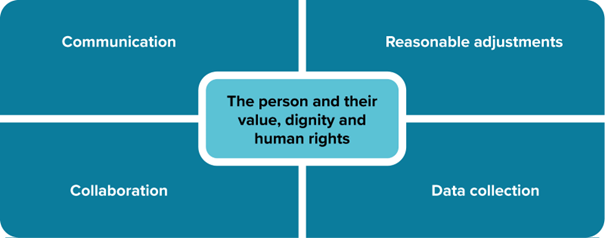Partnering with Consumers Standard
Intellectual disability and the Partnering with Consumers Standard
The aim of the Partnering with Consumers Standard is to create an organisation in which those receiving health care are involved in service planning, design, delivery, measurement and evaluation, and are partners in their own care. The organisation’s systems and processes are designed to support the workforce to deliver person‑centred care.[52] Person-centred care is fundamental to safe and high-quality health care. It is care that is respectful of, and responsive to, the person’s preferences, needs and values.[53]
For people with intellectual disability, the lack of targeted adaptations, policies, knowledge and confidence within health services is often a barrier to genuine partnership.22,25,46,47,[54],[55],[56],[57]
People with intellectual disability and their families are more likely to have poor experiences in healthcare settings that include:2,14,15,34,35,54,56,[58]
- Healthcare providers failing to ask if the person has an intellectual disability
- Healthcare providers not effectively communicating with the person with intellectual disability
- A lack of understanding of the role of National Disability Insurance Scheme (NDIS) service providers
- Little or no consideration of critical information provided by the family, supporters or guardian
- A lack of follow-up and communication with family, supporters or guardians after physical examinations, tests and treatments
- Medication errors and polypharmacy
- Trauma, neglect and untreated pain.
The Commission has developed a model with four domains of action to develop effective organisational and individual partnerships with people with intellectual disability.2,10,24,34,50,54,57
Figure 2: Components needed for inclusive health care

